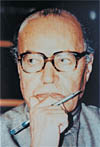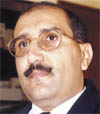Samira Bin Daair Yemeni Rural Women are overburdened [Archives:2000/39/Interview]
Samira Ali Bin Daair is at present working as the Program Manager of Unifem, implementing the Post Beijing Project,Phase II. She has worked at different international organizations in various domains. She has a B.A.Honors degree in English Literature and Philosophy from the university of Karachi, having obtained a scholarship under a technical assistance program in Aden. She did her masters degree in Curriculum Development from the University of Manchester,U.K. She lived and worked in the United Arab Emirates for some years and she and her husband decided to return to Yemen to bring up their three children and feel more settled.
Galal Al Sharaabi of the Yemen Times asked her some questions in a personal interview:
Q: Who is Samira Ali Bin Daair?
A: That is a strange question ..I think the best judge of who Samira is are people..although I must warn you that everyone will tend to give you a different version, because one always sees different colors in a rainbow due to many factors apart from perception. Unless I have Oscar Wildes Picture of Dorian Gray I cannot judge myself.
Q: What are the difficulties facing Yemeni women?
A: So much has been said about the problems facing Yemeni women that I am afraid all I say here will be clichs. There are problems that confound the Yemeni people in general and maybe women are more vulnerable to some of them. There are problems of poverty in the context of meager national resources and the structural adjustment package. There are problems of access to available resources that women face.There are problems of misconceptions pertaining to womens status in Islam that limit her mobility and basic right to education, etc. Apart from people mixing up between bad tradition and Islam, the later which has endowed women their basic human rights, and even if the personal status law or family law were perfect, there are problems of protection when a womans right to inheritance, maintenance in the event of a divorce, and many other rights are violated. I think women in the early days of Islam probably fared better in some respects, if we for a moment forget the veneer of sophistication and modernization we see around us. I do not wish to be pessimistic, but simply wish to go beyond superficialities to looking at the core issues concerning Yemeni women. The problems of women go beyond tradition and social practices, they are of a very complex nature, difficult to extricate from the general problems of the Yemeni family and the problems of development in Yemen.
Q: How do you view womens political participation?
A: I know there is a lot of talk these days regarding more women having decision making power, and in the majority of cases,they mean political power and holding public office. However, while it may be true that having more women in Parliament or public office as the case may be, may work to the interest of women, much also depends on whether those women will actually promote the interests of the majority, and also whether they will be allowed to go beyond tokenism and take important decisions affecting the lives of the majority. Secondly, there is also a danger that this overemphasis on public office may be a conscience-saving gesture which will stop us from looking at other mechanisms for the promotion of womens concerns. In other words, it may not work to the advantage of the majority of women who suffer from problems of access to the basics of life. The overemphasis on empowerment without specifying the how and what may also detract one from analyzing the real needs according to the socio-economic realities of Yemen. To give you one example, the education for development notion per se has long been disproved where some experiments in literacy have failed and it was found that adult literacy programs need to be backed by other resources.Education by itself does not always lead to socio-economic mobility, as it was believed to be the case in Paulo Freires time in Latin America. Organizations like Action Aid in Britain have voted for a more comprehensive approach towards development for the disadvantaged, with literacy being only one of the components. People may get educated but may still be barred from integrating into the national economy due to other factors. One has to understand the whole social stratification system in Yemen, in order to understand what can work for which group of people. Bernstein in his book Class, Codes and Control, talks about how codes and language became a barrier for the children of the working classes in Britain, who did badly in IQ testing as compared to those from the middle class for e.g., not because they were less intelligent. Therefore saying that the problems of Yemeni women only relate to social tradition is an oversimplification of the matter.
Q: What about womens education?
A: Well the figures for girls enrollment in school have increased in recent years. However, even here it is not always social tradition that limits their enrollment and in many cases has been the lack of adequate educational provision for girls education especially in the rural areas. More attention is now being paid by the govt. to girls education and more schools have been built, and a lot of innovative programs are being implemented by the ministry of education in coordination with the World Bank, Unicef and others. Notwithstanding this fact, other measures need to be taken, like adding relevant materials to specific geographical areas and making the curricula more in tune with their needs. On the one hand the small pilot projects undertaken by some organizations give one the time to experiment but faces the problem of scaling it up at the national level. These small projects do not make a dent in the problem. I believe the sectoral approach now practiced by international organizations will be more effective in terms of backing the ministry of education and tackling the problem at the central level; even if this is also prone to other problems of management and bureaucracy,etc. However a happy marriage between the micro and the macro level is necessary for sustainable development.
Q: Do you think that rural women have obtained their rights or do they need more attention paid to their problems?
A: I always feel strongly about rural women and the fact that they work very hard within the backdrop of few support services. Yes, they are overburdened and unfortunately there is a tendency to concentrate on surveys and identification of problems, and turning the poor into an object of academic debate. While it is true that it is necessary to delineate the nature of the problem and formulate clear plans for development, it is also necessary to affect the relevant interventions to relieve their burden and make life easier for people, in the short term. Even the issue of poverty needs to be tackled at different levels, i.e., at the national institutional level and building the infrastructure and policies, and also at the micro level, ascertaining that people can access to the social safety net. There are immediate emergency measures that need to be taken whilst the more long-term developmental ones are also being formulated. Sometimes it may be good to also give the people fish lest they be fishing in the dead sea even whilst teaching them the art of fishing, as the Chinese proverb goes.
Q: What, in your opinion, are the problems of development in Yemen?
A: That is a really loaded question .not easy to answer but I will try. Opinion on what constitutes development has changed drastically in the last decade or so. Development literature tends to look at the issue more wholistically in terms of access to basic needs like food and shelter,health and education, as well as access to livelihoods and a host of other things. Poverty too is not only poverty in terms of an income but also education and the ability to earn ones livingsuch a thing as capability poverty, social poverty due to discrimination,etc. However, in my view, the development level of a nation is judged by the well being of its people, to put it very simplistically. Also, development is something that grows from the roots from inside the ground like a well cared for tree, and transplant is not always the best form of growth, even if cross pollination may be necessary. Development is something that must grow from the society and the nation needs to invest in its people who will affect development.
Q: I have seen your articles published in Yemen Times in the pastwhat are your major publicationsand why have you stopped writing?
A: I havent stopped writing as such. It is just that one goes through different phases in life. I used to write a lot of poetry in the past I have also published some research papers on education and other subjects whilst working in the Documentation and Research Centre in Abudhabi. I also published a book on Educational change in the United Arab Emirates based on a field study of schools. However, my work in the development world makes me drained at times so much so that I toy with the idea of opening a grocery store and finishing the novel I am writing. The children also keep me busy but I try to write now and then. Indeed we live in such a hectic world that quite often one forgets to think.something like a computer that is overfed with data.
Q: What is this novel about?
A: It is about life and all my experiences of people and events in the different countries I have lived in it is about social change and the new world disorder.
Q: Any last word?
A: Well, what else can I say.I have already said too much.sometimes silence is golden to keep the peace.something I havent learned very well yet.
——
[archive-e:39-v:2000-y:2000-d:2000-09-25-p:./2000/iss39/intrview.htm]


